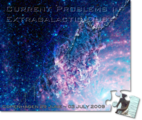COSMIC dust is of fundamental importance to astrophysics. Though dust is only a tiny fraction of the baryons in the Universe, it influences the formation of planets and stars in a fundamental way and contains half of all the metals synthesised over cosmic time. Dust also plays a key role in astronomical observations, obscuring the optical and UV light from star-formation in galaxies and accretion  onto compact objects, and reprocessing it into infrared radiation. Correction for the effects of dust is also the main observational uncertainty in current estimates of dark energy.
onto compact objects, and reprocessing it into infrared radiation. Correction for the effects of dust is also the main observational uncertainty in current estimates of dark energy.
Current Problems in Extragalactic Dust is a 5 day workshop with a small number of invited participants (30–40).
Dates: 29 June – 3 July 2009
Location: Niels Bohr Institute, University of Copenhagen
The workshop will focus on one issue each day and try to make progress via general overview talks and a large amount of time set aside between talks for intensive discussion in the relatively small group.
The focus of the workshop is dust on a cosmic scale—where and when most of it forms and grows and what its properties are in those circumstances and how dust affects the physics and observations of the early Universe and cosmological parameters. The workshop is therefore of particular interest to those working on dust directly, dark energy, reionization, star-formation, and future users of ALMA, Herschel, and Planck for extragalactic work.
Supported by the Dark Cosmology Centre, the Niels Bohr International Academy, the Instrument Center for Danish Astrophysics and The Nordic Network for Astrophysics and Cosmology.
Current Problems in Extragalactic Dust is a 5 day workshop with a small number of invited participants (30–40).
Dates: 29 June – 3 July 2009
Location: Niels Bohr Institute, University of Copenhagen
The workshop will focus on one issue each day and try to make progress via general overview talks and a large amount of time set aside between talks for intensive discussion in the relatively small group.
The focus of the workshop is dust on a cosmic scale—where and when most of it forms and grows and what its properties are in those circumstances and how dust affects the physics and observations of the early Universe and cosmological parameters. The workshop is therefore of particular interest to those working on dust directly, dark energy, reionization, star-formation, and future users of ALMA, Herschel, and Planck for extragalactic work.
Supported by the Dark Cosmology Centre, the Niels Bohr International Academy, the Instrument Center for Danish Astrophysics and The Nordic Network for Astrophysics and Cosmology.

